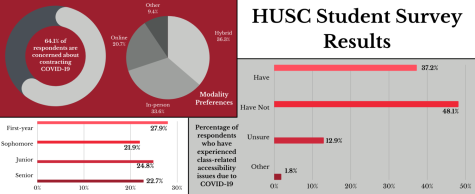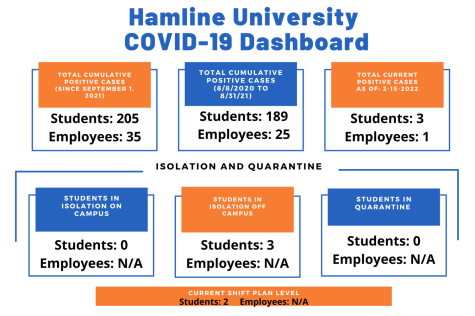HUSC Survey Results: Masks and Online Options
Hamline Undergraduate Student Congress has shared results from the student survey about COVID revealing that access to proper masks and online class resources are on students’ minds.
February 23, 2022

Results from the Hamline Undergraduate Student Congress (HUSC) COVID-19 student survey were shared through email on February 11 highlighting the topics of access to masks and options for online class resources.
The email sent from the Dean of Students office included a few statistical summaries of topics as well as a brief list of steps the institution and HUSC are moving toward.
The survey, which was sent on January 24 and remained open for a week, received 513 responses, a higher rate than usual on surveys sent like this, something HUSC External President Raina Meyer credits to HUSC members who widely shared the survey through social media and email.
“We’re really proud of the reach that we were able to get on our survey… It’s much more than the previous survey regarding COVID modality got and I think it really speaks to how much students needed to have a way to express their feelings,” Meyer said. “I think it also speaks to our efforts as a council to engage students and help them understand that we will utilize their input and help push for the changes they want to see.”
The breakdown showed that 27.9% of respondents were first-year, 21.9% sophomore, 24.8% junior and 22.7% senior.
The results have been shared with Hamline offices, such as the Dean of Students and the Provost, and administration in an effort to continue the conversation around student needs.
“The Dean of Students Office and the Provost office have been incredibly helpful… and they have communicated with higher levels of the administration, including the President’s staff, to make sure that these student voices are making it to the highest levels of Hamline,” Meyer said.
Hamline has been mostly in-person this school year, with hybrid and online options in certain cases. This is a topic of disagreement among the Hamline community as some feel comfortable doing so, while others prefer online platforms.
This was reflected in survey results with 36.3% of respondents preferring mostly hybrid or blended modes. Predominately in-person received 33.6%, fully online had 20.7% and other preferences received the remaining 9.4%.
With Hamline’s new mask mandate in classroom spaces and any other on-campus area, a multilayered mask must be worn. This includes KN-95s or a surgical mask and cloth mask.
Hamline has purchased and distributed over 7,500 KN-95 masks to date, according to Dean of Students Patti Kersten, an initiative that continues with the most recent distribution day happening on February 15.
The spring semester began as the Omicron Delta Variant was prevalent, a fear many had as they settled back into campus and academic life.
The results showed that 64.1% of respondents reported experiencing worry or anxiety about contracting COVID-19 during this semester. The remaining 32.9% do not experience any and 3% reported other.
“Administration and HUSC have continued to purchase KN-95 masks …for students because so many students said that they didn’t have consistent access to high-quality masks. I think it was 57%… before the semester started said that they did not have consistent access,” Meyer said.
Between the mask mandate and encouraging boosters, Hamline works to protect itself and the surrounding community.
“Currently we have multiple meetings a week to stay current with all aspects of COVID. A group from Hamline are always on the Minnesota Department of Health [MDH] higher ed calls – the information shared on this call provides detailed information to guide our ongoing response as we continue to review masking, vaccination/boosters, isolation/quarantine guidelines, testing options/supplies, and a variety of other aspects that assist us in working together to keep our campus as safe as we possibly can,” Kersten wrote in an email statement to the Oracle.
The survey email also shared results regarding student experiences related to class accessibility issues because of COVID-19. 48.1% of respondents said no to experiencing any issues, 37.2% said yes, 12.9% said not sure and 1.8% fell into the other.
Interim Provost Andy Rundquist has instructed professors to provide alternative learning options for students who are unable to attend class due to COVID-19, according to the email.
This does not mean there must be a Google Meet or Zoom option for class, but that some form of alternative is created in order for those students not to fall behind. Some examples the email provided include live stream, a recording and creating assignments that can be completed remotely.
“It is imperative that these mandatory absences from class do not negatively impact student grades,” the email read.
Students are encouraged to contact the Provost or Dean’s office of their college if they are experiencing any accessibility issues due to COVID-19.
HUSC is considering sending out another survey halfway through the semester to stay up to date with how students are feeling with the changing nature of the COVID-19 situation.
“I can’t speak for future administrations. I hope that they would approach it with a similar outlook, in terms of getting students’ voices and channeling them in a way that is productive. But in our administration, Ruben and I entered the year with really wanting to get as many perspectives as possible and making sure that those don’t just sit within general assemblies and kind of go round and round in circles like it has in the past with HUSC, but really making sure that those opinions get to the higher levels of our university because I think that’s really what students want and they want to see change happen based on that,” Meyer said.

